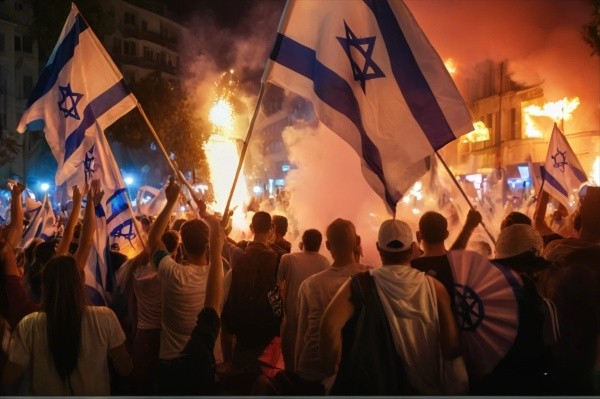Iran’s Plan to Strike Back Against the U.S.
Iran’s Military Preparations Following U.S. Attacks
Loading...

On Saturday, tens of thousands of Israelis gathered in Tel Aviv to protest against Prime Minister Benjamin Netanyahu's government, calling for new elections and the return of hostages held in Gaza.
This rally marks another in a series of large-scale demonstrations that have been taking place weekly in the city, reflecting growing public discontent with the government's handling of the ongoing Gaza conflict.
The protest, which anti-government organization Hofshi Israel estimates to have drawn over 150,000 participants, saw demonstrators waving Israeli flags and chanting slogans against Netanyahu's administration. Many carried signs with messages such as "Crime Minister" and "Stop the War," expressing their frustration with the nearly nine-month-long war in Gaza that began following Hamas' attack on southern Israel on October 7.
Shai Erel, a 66-year-old contractor attending the protest, voiced concerns about the future of his grandchild, stating, "There will be no future for them if we don't go out and get rid of the horrible government." This sentiment was echoed by many protesters who expressed dissatisfaction with the current leadership.
The demonstration included dramatic displays of dissent, with some protesters lying on the ground covered in red paint in the city's Democracy Square, symbolizing what they perceive as the death of Israel's democracy under Netanyahu's rule.
A notable moment in the rally was an address by Yuval Diskin, a former head of Israel's domestic Shin Bet security agency, who condemned Netanyahu as Israel's "worst prime minister." This statement from a former high-ranking security official underscores the depth of opposition to the current government even among those with intimate knowledge of Israel's security apparatus.
Many protesters expressed frustration with Israel's right-wing coalition, which includes controversial figures like Security Minister Itamar Ben Gvir and other far-right ultra-nationalists. Critics accuse this coalition of prolonging the war in Gaza and jeopardizing both Israel's security and the lives of the hostages still held by Hamas.
The issue of the captives held in Gaza remains a central concern for many Israelis. Hamas militants seized 251 hostages on October 7, and Israel believes 116 remain in Gaza, including 41 who the Israeli army says are dead. A separate rally in Tel Aviv on the same night drew thousands of relatives and supporters of these captives, highlighting the ongoing trauma and urgency of this issue for many Israeli families.
The scale and frequency of these protests reflect a growing crisis of confidence in Netanyahu's leadership and his government's war strategy. Many attendees, like Yoram, a 50-year-old tour guide, expressed a desire for immediate elections, fearing that waiting until the scheduled 2026 elections might compromise Israel's democratic process.
These protests are taking place against the backdrop of a devastating conflict. The initial Hamas attack on Israel reportedly resulted in 1,194 deaths, mostly civilians, according to an AFP tally based on Israeli official figures. Israel's retaliatory offensive in Gaza has been even more catastrophic, with at least 37,551 people killed, also mostly civilians, according to the health ministry in the Hamas-ruled territory.
As the conflict continues and public dissatisfaction grows, these mass protests in Tel Aviv represent a significant challenge to Netanyahu's government and its policies. The demonstrators' demands for new elections and a resolution to the hostage crisis underscore the complex and contentious nature of Israel's current political and security landscape.
BMM - MBA
Iran’s Military Preparations Following U.S. Attacks
Troops remain in five strategic locations, raising fears of renewed tensions and long-term occupation.
Opposition forces have taken control of the capital after a significant offensive. Here is how it unravelled.
